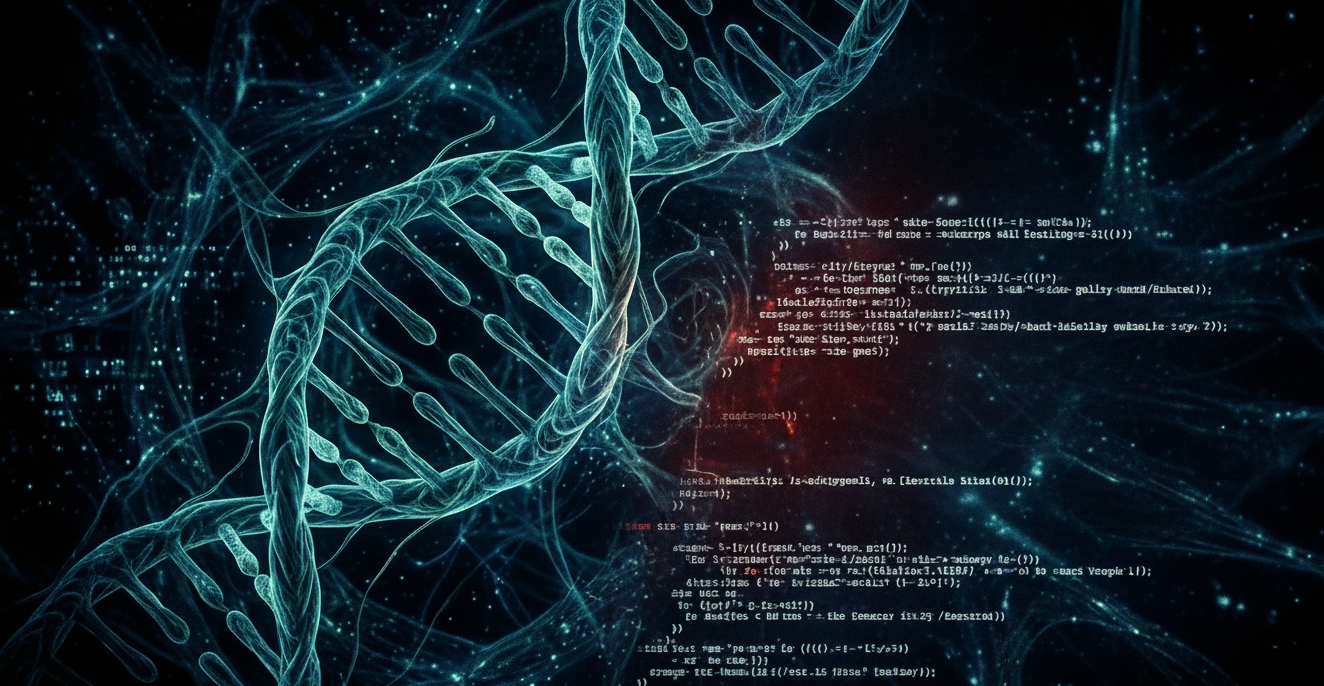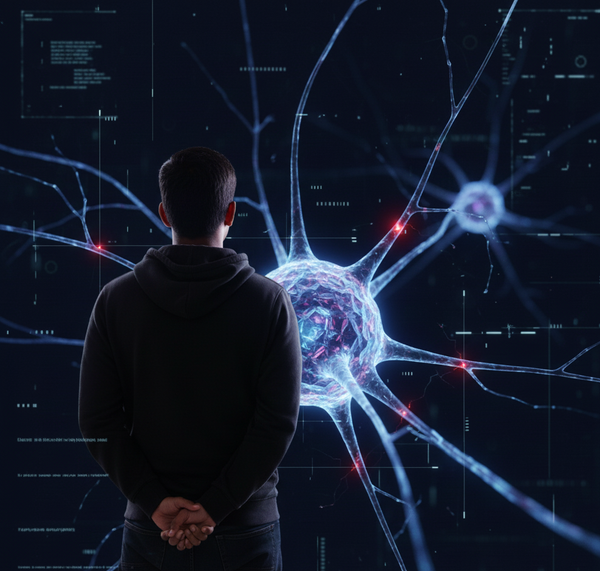The Life Paradox: Why Your DNA Isn’t a Blueprint

If life is just a series of genetic programs, why can’t we predict the behavior of an embryo as easily as the flow of a river? This post dives into the "blind spot" of modern biology: the assumption that complexity is just a matter of scale. It’s time to stop trying to reduce life to a computer simulation and start understanding it as a unique, creative phenomenon that transcends its own chemistry.
Dr. Elena Chen, a physicist turned evolutionary biologist. Dr. Marcus Doubtful, a physicist turned philosopher.
Elena: Marcus, I have to be honest - your recent talks have me worried. You're starting to sound like you're abandoning science altogether for some New Age nonsense. I mean, we've built this incredible framework with genetics and natural selection. It works! We can predict mutations, track inheritance, model population changes. And you want to throw that away for what?
Marcus: I'm not throwing anything away, Elena. But tell me something - when you were doing physics, could you actually predict how water would flow around a rock just from quantum mechanics?
Elena: Well, no, but theoretically...
Marcus: Right. Theoretically. But in practice, you had to use fluid dynamics, which treats water as a continuous medium, not a collection of quantum particles. You had to use concepts that don't exist in the context of quantum mechanics - like viscosity and turbulence. You've essentially abandoned the reductionist program in practice while maintaining it theoretically as an assumption.
Elena: That's just a matter of scale and computational power! Give us better computers and we'll reduce fluid dynamics to quantum mechanics. That's how science progresses - we don't give up and retreat into mysticism!
Marcus: Is it though? Or is it that some properties only make sense in certain contexts? When I watch a chick embryo develop, I recognize cells migrating, tissues folding, organs taking shape. Sure, genes are involved and molecules, but there's something else - a kind of organized autonomous creativity.
Elena: Oh, come on! "Autonomous creativity"? You're anthropomorphizing biological processes! We can trace that back to gene regulatory networks! Master control genes, signaling cascades - it's all mechanistic!
Marcus: Okay, let's try a thought experiment. Imagine I gave you the complete genetic sequence of that chick embryo, plus perfect knowledge of all the proteins and their interactions - if that was even possible! Could you predict that this particular embryo would develop a slightly curved beak because of how it positioned itself in the egg?
Elena: Well... given enough computational power, yes! We just need better models, more data...
Marcus: Elena, be honest. You know we can't. There's something about living systems that's not captured in the mechanical interactions of parts. It's like trying to understand a conversation by analyzing the physics of sound waves. Sound waves are part of the puzzle, but by no means the whole thing!
Elena: But that's just complexity! We're getting better at handling complex systems all the time. Artificial Intelligence - we're solving problems that seemed impossible just decades ago. You're giving up just when we're on the verge of breakthroughs!
Marcus: What if it's not just complexity? What if it's something fundamentally different? Think about your own experience right now, in this conversation. Are you just executing genetic programs?
Elena: Of course not, but humans are special. We have consciousness, culture, language...
Marcus: Are we? Watch a bacterial colony respond to antibiotics. Some bacteria will sacrifice themselves to protect others. They'll coordinate, communicate, adapt in ways no one predicted. I recognize autonomous creativity in a bacteria colony. I recognize life! Is that so different from what we're doing right now?
Elena: Yes, it's completely different! Bacteria don't have intentions or consciousness. They're following chemical gradients and genetic programming. You're reading purpose into mechanical processes!
Marcus: Well, you’re forcing a reductionist, mechanistic paradigm onto something like a bacterial colony — or any living system, really. And in doing so, you’re stripping away properties we intuitively associate with the concept of life itself, like autonomous creativity. Maybe it’s not life that’s obscure — maybe it’s the reductionist lens that blinds us.
Elena: But don’t you see? If we throw out reductionism, we’re throwing out science as we know it! Without breaking things down, how do we make progress? How do we test hypotheses? How do we tell genuine insight from wishful thinking?
Marcus: Maybe that’s the wrong starting point. Instead of obsessing over how to test, maybe we should first ask: what are we trying to understand in the first place? When we say “life,” what do we actually mean?
Elena: Biological processes, metabolism, reproduction, evolution - things we can measure and quantify! And then reduce mechanistically.
Marcus: Those are behaviors we observe in living beings, yes — metabolism, reproduction, evolution. But do they exhaust what we mean by "life"? Or are they just the measurable aspects of something that escapes our current definitions? When you look at your daughter playing in the garden, learning to ride her bike, making up stories - is that just metabolism and reproduction?
Elena: No... there's something more. You are right. She's creative, autonomous, making sense of her world... But that doesn't mean we need some mystical explanation! Neuroscience is making incredible progress understanding creativity and consciousness!
Marcus: Exactly. And I think that "something more" is part of the concept of life as much as biological processes are. But we've been trying to analyze the concept of life by breaking it apart into behaviors and only those that we can analyze using the scientific method.
Elena: So what's the alternative? How do we do science without breaking apart and reducing? What would this new approach look like? Just sit around and contemplate our navels?
Marcus: What if, instead of asking “What is life made of?” and reducing it to measurable parts, we asked something different: “What allows us to recognize life at all?” In other words, rather than discarding what we can’t measure, we explore the very conditions that allow us to recognize the concept of life.
Elena: That sounds... almost philosophical. And philosophy doesn't cure diseases or feed people!
Marcus: Why is that a problem? Physics had to become philosophical when we discovered quantum mechanics. Suddenly, the idea of objects with definite properties independent of observation became untenable. Maybe this is telling us something not so much about physics itself but about the limitation of the scientific method in certain contexts such as the concept of life.
Elena: What do you think Quantum Mechanics and the concept of life have in common? And this better not be some quantum consciousness nonsense!
Marcus: What's remarkable is that Quantum Mechanics doesn't describe fixed objects but fields of interaction possibilities. When we constrain the system - through experimental setup, boundary conditions, or measurement - we participate in actualizing specific possibilities from this field of potentials. In this sense, there's a creative aspect to the interaction between observer and quantum system that goes beyond passive discovery. That's not mechanical causation in the classical sense. And that's exactly what I think the concept of life has in common with the concept of quantum behavior: creativity that classical models can't fully capture.
Elena: So you're saying that the concept of life is not about just following mechanical rules, but constantly unfolding new possibilities? That sounds dangerously close to vitalism - the idea that life has some special non-physical essence!
Marcus: Exactly. When I think about the concept of life, I do not think just about passive reacting — I think about autonomous creativity. That's why I think reducing life to chemistry or genes alone misses something important: autonomous creativity.
Elena: But autonomous creativity sounds… subjective. How do we even begin to study that? How do we maintain scientific rigor? How do we avoid falling into pure speculation?
Marcus: That's where Geneosophy comes in. It's not about abandoning science — it's about expanding it. We already study the mechanistic processes that we ascribe to the concept of life. Geneosophy asks a different question: What are the conditions that allow us to recognize the concept of life, not just in its mechanistic aspects but also in the autonomous creative aspect.
Elena: So Geneosophy is that new way? And what makes you think this isn't just dressed-up philosophy masquerading as science?
Marcus: Geneosophy is a rational and formal way to bring actuality, possibility and autonomous creativity into the same comprehension as genes, cells, and molecules — without reducing one to the other.
Elena: You know what frustrates me most about this conversation, Marcus? Part of me wants to dismiss everything you're saying as unscientific nonsense. But another part of me... recognizes something in what you're describing. When I'm doing my best research, when real insights emerge, it doesn't feel purely mechanical. There's something creative happening that my models can't quite capture.
Marcus: That's the beginning of geneosophical thinking - recognizing your own participation in the comprehension of autonomous creative processes you're studying rather than pretending to stand outside them and mechanistically describing them.
Elena: But if we go down this path, how do we maintain the rigor that's made science so powerful? How do we avoid becoming just another form of humanities scholarship?
Marcus: Maybe the question isn't how to maintain rigor, but how to develop new forms of rigor appropriate to studying autonomous creativity. Physics didn't become less rigorous when it embraced quantum mechanics - it became rigorous in a new way.
Elena: This is either brilliant or completely insane. I can't decide which.
Marcus: Maybe that uncertainty is exactly where we need to be - on the edge between what we know and what we're still discovering.




